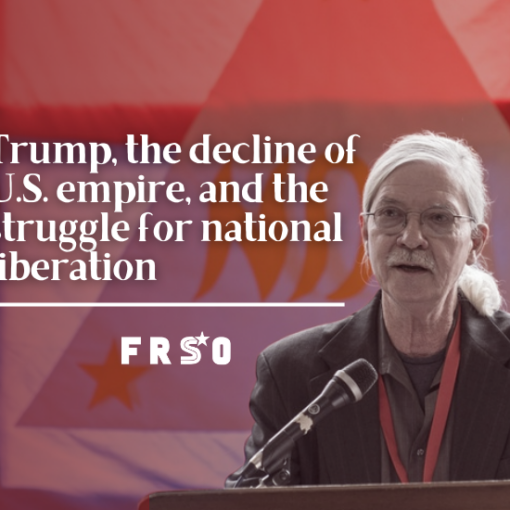Contribution to the International Communist Seminar
“The World Socialist Revolution in the Conditions of Imperialist Globalization”
Brussels, 2-4 May 2001
By Steff Yorek and Mick Kelly
for the National Executive Committee
Freedom Road Socialist Organization, USA
The demonstrators who converged on Seattle in November 1999 to protest the meeting of the World Trade Organization did an excellent thing – both for the people of this country and the peoples of the world.
The Seattle demonstrations shined a spotlight on the agenda of exploitation and oppression that is being advanced under the banner of “free trade.” There is no doubt that heat in the streets contributed to the collapse of this round of trade negotiations. While the bourgeois media cried, we cheered because it was a good thing for workers, farmers, and the environment.
Monopoly capital had high hopes for that WTO meeting. The most powerful countries had hoped to conduct business as usual, to get together behind close doors, and impose their will on everyone else. These dreams disappeared into a cloud of tear gas.
The presence of workers, farmers, and progressive activists from scores of countries is an example of putting the slogan “workers and oppressed peoples unite” into practice. Since Seattle, powerful demonstrations in Washington DC, Prague, and Quebec, confirm that a new movement has arrived on the scene. The social effect of this movement and the struggle it has built is extremely positive.
The anti-globalization movement’s internal development is leading toward a more consistent critique of capitalism, paving the way for the recognition that to consistently oppose corporate globalization, one must oppose monopoly capitalism (imperialism).
The purpose of this paper is to briefly analyze the state of U.S. Imperialism, and the role of the world crisis of overproduction. On the question of imperialist globalization, we challenge some wrong ideas that are advanced by revisionists and social democrats. Finally, we talk about the need to apply the mass line in dealing with mistaken ideas in the anti-corporate globalization movement.
We place some emphasis on the crisis of capitalism, because it is one of the basic laws of motion that shapes imperialism. Capitalist crisis will also impact the fronts of struggle for the movement against imperialist globalization.
Some Points on Terminology
As Marxist-Leninists, we know that the term “globalization” originated in bourgeois academic circles. It can serve to cover up and confuse the issue of Imperialist exploitation of the Third World. Imperialism is monopoly capitalism; at best, “globalization” can serve as a general, popular, description of imperialism’s development in the current period. At its worst, the term “globalization” is a banner for glorifying and asserting the permanence of imperialist domination.
While the term is clearly not ideal or Marxist, we use it nonetheless, prefaced with corporate or imperialist. Likewise, we talk about the anti-corporate globalization movement.
The State of U.S. Imperialism, Competition and Crisis
While U.S. monopoly capitalism appears strong, in fact it is weak. As in the years before the Great Depression, relative stability gives way to instability; a bust follows the economic boom. Advances in the productive forces (computerization, information technology, communications, etc.) have contributed to the further spread of capitalist relations on a world scale, buttressed semi-feudal relations in the Third World, and have led to an intensification of exploitation.
For the United States, the main instruments of this process have been: the export of capital in the form of direct foreign investments; leveraged control of foreign financial markets; U.S. dominated multi-lateral financial institutions (WTO/IMF/WB); and military means. The latter is of special importance in a world divided between the blocks of imperialist powers – we live in an era where countries want independence, nations want liberation, and people need revolution.
At the forefront of the process of imperialist globalization, stands the United States, with the European Union led by Germany, and then Japan, trailing close behind. The basic contradictions in the world are intensifying; the contradiction between socialized production versus private appropriation, inevitably leads toward crisis. All of the imperialist powers have found it necessary to attack their domestic social safety nets and workers’ rights, while strengthening their respective military machines.
While U.S. Imperialism has been in a period of relative decline since the early 1970s, it has emerged as the dominant power since the fall of the Soviet Union, using its economic, political, and military might to dictate policies to other competitors and the countries it oppresses.
The U.S. is the top foreign investor in most of Latin America, many parts of Asia including India, and certain parts of Africa. The North American Free Trade Agreement, renamed the Free Trade of the Americas Agreement (FTAA) is set to expand to other Latin American countries as the U.S. continues to reinforce sphere of influence.
The U.S. also dominates a number of multi-lateral financial institutions such as the World Trade Organization, the International Monetary Fund, and the World Bank, where the Western powers collude and contend over turf and markets. These institutions all have their origins in the post-World War II period, when outside the socialist camp, the U.S. held hegemony. Times changed, the national liberation movements grew while Japan and the European countries asserted their independence. One result is that institutions like the World Trade Organization (which grew from the old GATT) are wracked by internal contradictions.
After World War II, U.S. imperialism was top dog, with growth in the manufacturing sector conditioned by minimal global competition. The massive defense spending of the Cold War period and the relatively high wages of the U.S. worker marked the U.S. as the largest industrial economy in the world. At the very moment the rich were crowing about the American Century, it was ending. Competition from Europe and Japan, the existence of a Socialist camp, along with blows from the national liberation movements, came together to end U.S. global hegemony. 1971 marked the end of the U.S. monetary order established at Breton Woods in 1945. Until then, the value of major currencies was fixed against the dollar.
In response to this decline, monopoly capitalism shifted to a policy of neoliberalism in the 1980s. Neoliberalism is characterized by the accelerating concentration of capital into the hands of the monopoly capitalists and the delivery of public funds to private corporations while pushing down employment, lowering wage levels and reducing social spending.
Concentration of Capital
When examining the state of imperialism, or imperialist globalization it is important to note that there exists a fundamental fallacy, in both the popular mind and in some sections of the progressive movements, which are going into battle against globalization. Some individuals and organizations have attempted to define globalization and neoliberalism as new phenomenon, distinct and separate from imperialism. In fact, these phenomena are not new. Where they represent something particular to the last decade the difference is quantitative, and not in any way fundamental.
There is a tendency to concentrate capital in the three main imperialist blocks, Japan, the European Union, and the U.S. More than 70% of the global flow of direct investment is concentrated in the U.S. and likewise 68% of U.S. direct investments are in Japan, the European Union and Canada. This tendency has intensified slightly since 1998, when the Asian Economic crisis hit South Korea and Indonesia, and capital fled to the imperialist countries.
Global Context
There is a generalized crisis of overproduction on a world scale. The Turkish economy has collapsed. The Philippine economy is in a crisis, and Argentina is very unstable.
In an earlier phase, this crisis appeared as the Asian economic crisis of 1997 and 1998 that developed in the context of a complex set of circumstances. Export-oriented economies suffered a crisis of overproduction. In order to unload exports these countries were forced to devalue their currency. They had formally linked their currencies to the dollar. There was an underlying weakness that showed itself when a strong rise in the dollar occurred in 1996. As the Asian economies trade balances collapsed it caused panic and capital flight. This led to crisis in the financial markets. This was a world crisis where the weak were taken out first. The IMF moved in to stabilize the situation. Western capitalists then proceeded to loot national industries in South Korea, and other Asian countries.
To the surprise of many, the United States was temporarily able to escape most of the impact of this crisis. That is because the U.S. started out ahead. The U.S. has been out front because of its technically-advanced productive forces. It was able to cushion the problems of 1997 with the super-profits earned from its technical advantage. Two other factors leading to this advantage were deregulation and the strong U.S. position as a stable home base for capital inflows.
The sum of U.S. shares in the hands of foreign nationals amounts to $6.5 trillion USD, approximately equivalent to 79% of the U.S. gross domestic product. Because of an increasing dependence on the absorption of capital flows from countries with a surplus, it is likely that the U.S. will be unable to easily absorb the impact of recession.
In some circles, there is a tendency to oversimplify globalization: a crude caricature is created where the global capitalist confronts the global worker. In reality, U.S. investment is overwhelmingly concentrated in the imperialist countries and a relative handful of about 13 Third World countries. In reality, the law of uneven development continues to operate.
On the other hand, in the context of imperialist globalization we need to see that there is a dialectical relationship between economic developments in other imperialist countries, the Third World and the United States. This is of particular importance as we examine the phenomenon of the crisis of overproduction on a world scale. No one is an island, and the U.S. economy is not a closed system.
We have examined some of the features of imperialism today, as one of the errors of a section of the anti-corporate globalization movement is to treat globalization as a process and phenomenon, which just came into being devoid of context or economic laws.
Fight Against Imperialist Globalization is an Objective Process
To fight imperialist globalization is to resist imperialist domination.
While the spectacular demonstrations in the advanced capitalist countries are of great significance, and represent a political awakening on the part of working people and others, objectively the front lines of the struggle are in the Third World, and the former socialist countries.
The principal contradiction in the world today has been and remains that between the handful of monopoly capitalists who rule the advanced capitalist countries, and the broad masses of oppressed peoples in Africa, Asia, the Middle East and Latin America.
This truth should be important to communists, not only because we are interested in having a concrete analysis of concrete conditions, or because of our responsibilities as proletarian internationalists. The basic point here is that there are favorable conditions as we carry out our work in the anti-globalization movement. We can point out a reality to those we fight along side with: in Colombia, Iraq, Palestine, the Philippines, Congo and elsewhere, the masses of people are resisting imperialist globalization and the anti-globalization movement should stand with and support them. This will help to raise people’s understanding as we work to build an anti-imperialist movement.
Correcting mistaken ideas
Many people believe that cold weather causes pneumonia. That shows a lack of medical knowledge on the part of the public. In fact, it is a bacterial infection and can be treated with antibiotics. That being said, we judge an average person who has pneumonia differently than we judge a doctor. A doctor that treated pneumonia by saying, “Stay warm,” would be criminal in their ignorance.
Likewise, we need to draw a distinction between the masses who have been influenced by incorrect summations of corporate globalization, and those who should know better.
Wrong Views of What to Do
The slogans of some trade union demonstrations have been to “fix” the institutions of imperialism, to make them be more “democratic and representative” of workers’ interests, for example the slogan “No globalization without representation!” The slogan wrongly assumes that imperialism would be okay, if only there were more democracy.
Unfortunately, those who should know better, make the same errors. The old Communist Party USA, with its many good activist and organizers, advanced the wrong slogan in their newspaper that the WTO needed to be “fixed.” They may as well have raised the slogan “repair capitalism.” In doing this, they were tailing behind the trade union bureaucracy. Perhaps realizing that slogan was off the mark, in their theoretical journal they called for abolishing the WTO, and then suggested trade agreements should be negotiated at the United Nations. Perhaps other countries can be lucky enough to get a food for oil trade agreement like Iraq! The leaders of the C.P. say they are Marxist-Leninists, so we hold them to higher standard than the rank and file participant in a demonstration.
Theories of Ultra-Imperialism Separating the State from Capital
In the anti-globalization movement, imagery has been created of the “global capitalist,” divested of national boundaries who goes up against the global worker, also divested of national boundaries.
It’s wrong to separate the respective capitalist states from the capitalists who control them. It’s contrary to reality. If the situation was one big corporation against the rest of us, we could assume that there would be little or no contention between the imperialist powers.
This vision is a rehash of the views of the social democrat Kautsky, who put forward the idea that capital would merge on an international level, interconnection would become primary, and the world would be dominated by a single global imperialism, or ultra-imperialism. According to Kautsky, this “ultra-imperialism” was reformable. Indeed, in this revisionist theory, imperialism means peace.
Every substantial block of capital commands a state apparatus. The soldiers of the big oil companies are not fighting in Colombia. It’s the U.S. Special Forces, the American Air Force, and the CIA. In the Congo, it’s troops from Rwanda and Uganda, who live in the countries under neo-colonial domination who fight and die for U.S. Capital. Wall Street Bankers don’t pilot planes. Nor do brokerage house employees. U.S./NATO pilots carry out war crimes in Yugoslavia.
That said, people are entirely right to hate the heads of Western or Japanese based multi-national corporations that roam the earth to loot the land, labor, or natural resources of others.
A Sort of Trotskyism: Ignoring the Law of Uneven Development
There is another theoretical weakness inherent in the idea of the global capitalist without a country, facing off against the global worker. That is, imperialism development is uneven. Capitalist relations of production still exist side by side with semi-feudal production relations. In vast sections of the world, the majority of the population is peasants, who under the leadership of the proletariat constitute a vital force for revolution. Thus uneven development gives rise to the possibility of people’s wars, which target feudalism, the compradors, and bureaucrat capitalism. This is left out in a world view that sees only Nike and sweatshops. Like in Trotsky, the role of the peasantry is underestimated.
Clarifying Our Friends And Enemies
Again we need to draw a distinction between those who are concerned about their jobs or the environment, and those who front for the rich and powerful. A section of U.S. national capital (textiles) has put some money into the anti-globalization movement. Their interest and the interests of working people diverge. In the U.S., there can be no identity of interests between exploited and exploiter.
To take this point a bit further, in the United States, it is inexcusable for communists to be talking about the defense of “national interests.” It’s right to say that U.S.-dominated multi-lateral institutions like the WTO are undemocratic and make their decisions behind closed doors. The same thing can be said of the U.S State Department. For socialists to say the “the country is being sold out,” as if all classes have a common interest, is ridiculous.
Need for the Mass Line
In dealing with misconceptions about corporate globalization, we need to apply the mass line. While we should be uncompromising in combating the nonsense of the social democrats or the Trotskyites, under no circumstance should we pit ourselves against those in motion to resist corporate globalization. Rather we should work side-by-side with them and patiently explain things.
Mao made the point: “In all practical work of our Party, all correct work in necessarily ‘from the masses, to the masses.’ This means: take the ideas of the masses (scattered and unsystematic ideas) and concentrate them (through study turn them into concentrated and systematic ideas), then go to the masses and propagate and explain these ideas until the masses embrace them as their own, hold fast to them and translate them into action, and test the correctness of these ideas in action.”
To put this another way, we use Marxism to sum up where people are at. Basing ourselves on what people are concerned about, on what folks actually want, we develop slogans, policies, plans, ways to fight back, that people will take up as their own. It is in this way that revolutionary theory becomes a material force. When people are acting on it, it moves out of the land of ideas, and becomes a material factor in the struggle.
For example, many Trade Union leaders have been engaging in the crudest sort of China-bashing, which merges anti-communism with national chauvinism. What’s a communist to do? Stay home and wait for a movement that has completely correct politics to arise? Of course not. We need to work with people and say to folks; who is it that attacks our living standard? It is the rich who run the U.S. Our enemy is on Wall Street. We should encourage U.S. trade unions and trade unions in other advanced capitalist countries to have relations with the All-China Federation of Trade Unions so we can discuss our common problems.
Conclusion
The movement against corporate globalization opens new possibilities for the work of communists. It is critical that we unite with, and help lead this motion.
When confronting the wrong ideas of the social democrats or the Trotskyites, we must be uncompromising. However, we need to take a different approach to misconceptions among the people.
We live in a era of imperialism and proletarian revolution. We need to go all out to build the people’s movements, including that against corporate globalization, raising the general level of consciousness and struggle, and winning the advanced to Marxism-Leninism. By carrying out these tasks, we can contribute to the struggle for revolution and socialism.
Contribution to the International Communist Seminar
“The World Socialist Revolution in the Conditions of Imperialist Globalization”
Brussels, 2-4 May 2001




